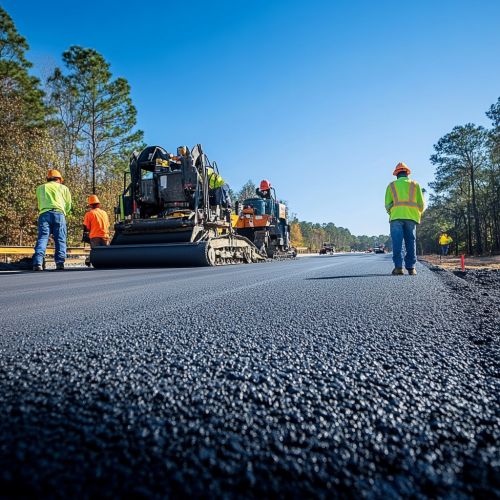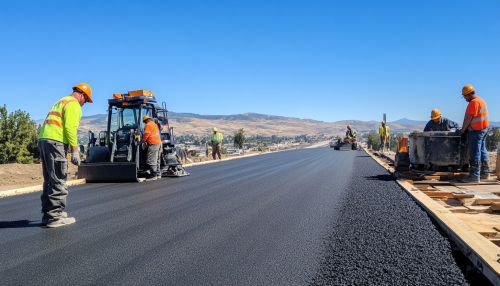Asphalt Concrete
Introduction
Asphalt concrete, commonly referred to as asphalt, blacktop, or pavement in North America, is a composite material used primarily in the construction of roads, parking lots, airports, and other types of infrastructure. It consists of mineral aggregate bound together with asphalt, a sticky, black, and highly viscous liquid or semi-solid form of petroleum. The material is known for its durability, cost-effectiveness, and ability to withstand various environmental conditions.
Composition and Properties
Asphalt concrete is composed of two main components: aggregates and asphalt binder. The aggregates, which make up about 95% of the mixture by weight, are typically a combination of crushed stone, gravel, and sand. These materials provide the structural framework of the pavement. The asphalt binder, which makes up the remaining 5%, acts as a glue that holds the aggregates together.
The properties of asphalt concrete are influenced by the type and proportion of the aggregates and the characteristics of the asphalt binder. The viscosity of the binder, for example, affects the flexibility and temperature susceptibility of the pavement. The aggregate gradation, or the distribution of particle sizes, impacts the density and stability of the mixture.
Manufacturing Process
The production of asphalt concrete involves several key steps. First, the aggregates are dried and heated to remove moisture. Then, they are mixed with the asphalt binder at a temperature between 150°C and 180°C. This process, known as hot mix asphalt (HMA) production, ensures that the binder coats the aggregates evenly.
There are also other types of asphalt mixtures, such as warm mix asphalt (WMA) and cold mix asphalt. WMA is produced at lower temperatures, which reduces energy consumption and emissions. Cold mix asphalt, on the other hand, is produced without heating the aggregates and is typically used for patching and maintenance work.
Types of Asphalt Concrete
Asphalt concrete can be categorized into several types based on its intended application and performance characteristics:
Dense-Graded Mixes
Dense-graded mixes are the most common type of asphalt concrete. They are designed to have a well-graded aggregate structure that provides a dense and impermeable surface. This type of mix is used for highways, runways, and other high-traffic areas.
Open-Graded Mixes
Open-graded mixes have a higher percentage of voids, which allows for better drainage and reduced hydroplaning. These mixes are often used in surface courses to improve skid resistance and reduce noise levels.
Stone Matrix Asphalt (SMA)
Stone matrix asphalt is a premium mix designed to provide superior rut resistance and durability. It contains a higher percentage of coarse aggregates and a rich asphalt binder content, along with stabilizing additives such as fibers or polymers.
Porous Asphalt
Porous asphalt is designed to allow water to drain through the pavement surface, reducing runoff and improving stormwater management. It is commonly used in parking lots and low-traffic roads.
Construction Techniques
The construction of asphalt concrete pavements involves several critical steps to ensure long-lasting performance:
Surface Preparation
Proper surface preparation is essential for the successful application of asphalt concrete. This includes grading and compacting the subgrade, applying a tack coat to promote adhesion, and ensuring proper drainage.
Placement and Compaction
The asphalt mixture is typically placed using a paving machine, which spreads and levels the material to the desired thickness. Compaction is then performed using rollers to achieve the required density and smoothness. Proper compaction is crucial to prevent premature pavement failure.
Joint Construction
Joints in asphalt pavements are potential weak points that require careful construction to prevent cracking and water infiltration. Techniques such as joint sealing and edge compaction are employed to enhance joint performance.


Performance and Maintenance
Asphalt concrete pavements are valued for their performance characteristics, including flexibility, load-bearing capacity, and resistance to weathering. However, like all materials, they require regular maintenance to extend their service life.
Distress and Failure Modes
Common distress modes in asphalt pavements include cracking, rutting, and potholing. Cracking can occur due to thermal stresses, fatigue, or reflective cracking from underlying layers. Rutting is caused by permanent deformation under repeated traffic loads, while potholes result from localized failures.
Maintenance Strategies
Maintenance strategies for asphalt pavements include preventive measures such as seal coating and crack sealing, as well as corrective actions like patching and overlaying. Timely maintenance can significantly extend the lifespan of the pavement and reduce lifecycle costs.
Environmental Considerations
Asphalt concrete is a recyclable material, and its production and use have several environmental implications:
Recycling and Reuse
Reclaimed asphalt pavement (RAP) is a valuable resource that can be reused in new asphalt mixtures. Recycling not only conserves natural resources but also reduces the need for landfill space and lowers greenhouse gas emissions.
Emissions and Energy Consumption
The production of asphalt concrete involves the use of fossil fuels, which contributes to emissions of carbon dioxide and other pollutants. Advances in technology, such as the development of warm mix asphalt, aim to reduce these environmental impacts by lowering production temperatures and improving energy efficiency.
Innovations and Future Trends
The asphalt industry is continually evolving, with research and development efforts focused on improving performance and sustainability:
Modified Binders
The use of modified binders, such as polymer-modified asphalt, enhances the performance of asphalt concrete by improving its elasticity, temperature susceptibility, and resistance to aging.
Smart Pavements
Innovations in smart pavement technology, including the integration of sensors and wireless communication systems, offer the potential for real-time monitoring of pavement conditions and traffic management.
Sustainable Practices
Sustainability initiatives in the asphalt industry include the use of recycled materials, the development of low-energy production processes, and the implementation of green construction practices.
